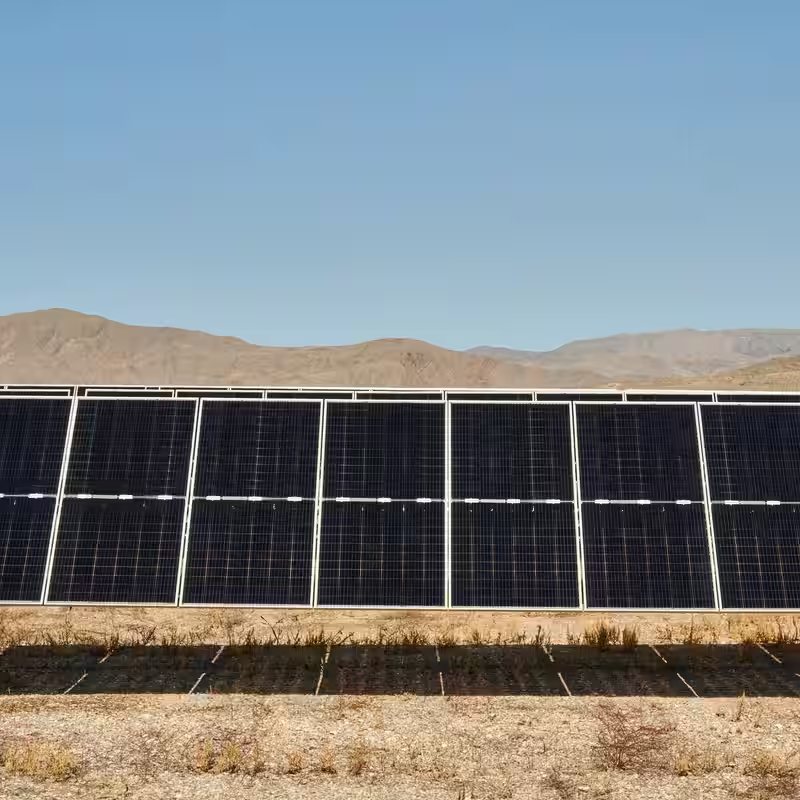Table of Contents
- What Was Esmeralda 7?
- Why the Cancellation Matters
- Political Shifts and Energy Policy
- Impact on Climate Goals
- Sources
What Was Esmeralda 7?
Esmeralda 7 wasn’t just another solar farm—it was poised to become one of the largest renewable energy projects on the planet. Planned across 118,000 acres of federal land in the Nevada desert, northwest of Las Vegas, the project would have generated up to 6.2 gigawatts of clean electricity—enough to power nearly two million American homes.
Developed by energy giants NextEra Energy and Invenergy, Esmeralda 7 included not only solar panels but also massive battery storage systems to deliver reliable power day and night. It had cleared key environmental reviews under the Biden administration and was advancing through the final stages of federal permitting.
But in a quiet update to its website, the Bureau of Land Management (BLM)—part of the U.S. Department of the Interior—recently marked the project as “canceled,” with no public explanation. Experts say the move aligns with a broader pattern under the Trump administration: systematically stalling or halting renewable energy development on public lands.
Why the Cancellation Matters
The loss of Esmeralda 7 represents more than missed megawatts—it’s a setback for U.S. climate leadership, job creation, and energy security. At full capacity, the project would have offset millions of tons of carbon emissions annually, equivalent to taking over a million gas-powered cars off the road.
Nevada Governor Joe Lombardo, a Republican, had even voiced concern about the administration’s new permitting hurdles, warning they could “unnecessarily delay energy development” critical for data centers and mining operations—two booming sectors in the state.
| Project Feature | Esmeralda 7 Details |
|---|---|
| Location | Nevada desert, NW of Las Vegas (federal land) |
| Capacity | 6.2 gigawatts |
| Homes Powered | Nearly 2 million |
| Land Area | 118,000 acres |
| Status | Canceled (2025, under Trump administration) |
Political Shifts and Energy Policy
Since returning to office, the Trump administration has reversed course on clean energy at lightning speed. The Interior Department now requires routine solar and wind approvals to undergo extra political review by the secretary’s office—a process that has created significant delays.
Meanwhile, oil and gas permitting continues uninterrupted. During the current government shutdown, Interior has even classified fossil fuel permit reviewers as “essential” workers—allowing drilling approvals to proceed while renewable energy staff are furloughed.
Adding to the irony: NextEra Energy, one of Esmeralda 7’s developers, reportedly donated at least $5 million toward the construction of Trump’s new White House ballroom, according to CBS News. Yet its flagship solar project appears to be caught in the crossfire of a broader ideological shift.
Impact on Climate Goals
Canceling projects like Esmeralda 7 undermines America’s ability to meet its international climate commitments. Renewable energy on public lands is a cornerstone of any serious decarbonization strategy—especially in the arid West, where sun and space are abundant.
Environmental advocates warn this isn’t an isolated case. The administration has also halted offshore wind construction off New England (though a federal judge recently allowed one project to resume) and launched investigations into bird deaths at wind farms—moves critics call pretextual.
“This isn’t about environmental protection,” said Dr. Lena Cho, an energy policy analyst. “It’s about prioritizing fossil fuels while creating bureaucratic roadblocks for clean energy—even when states and companies are ready to move forward.”
For now, Esmeralda 7 joins a growing list of stalled or scrapped clean energy projects under the current administration—a stark reversal from the momentum built during the previous term.




